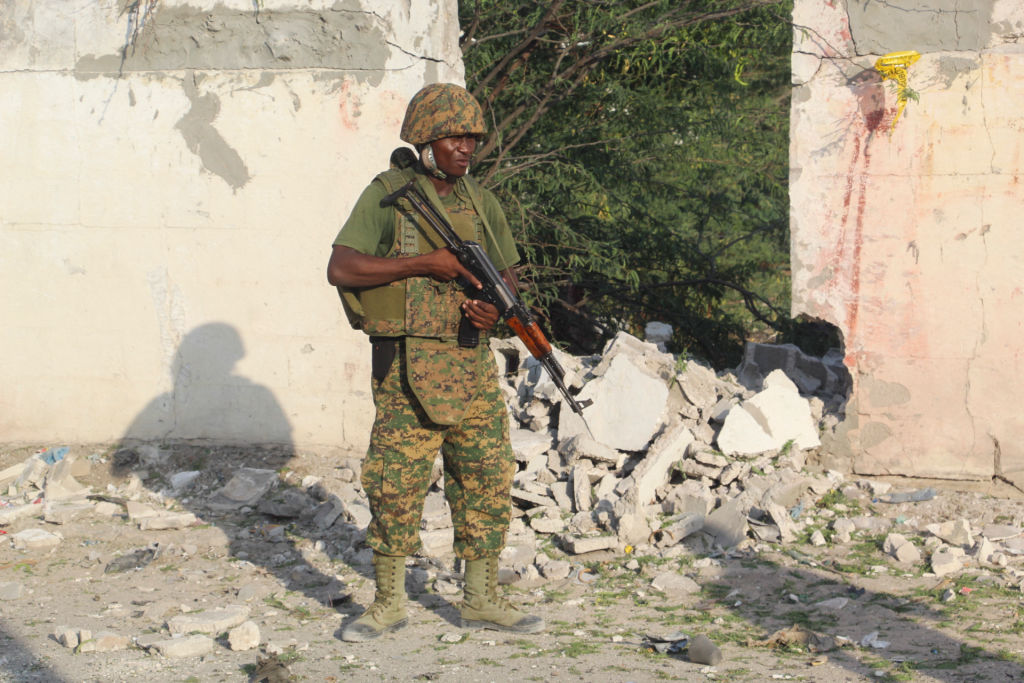ADF STAFF
The African Union’s decision to deploy troops to Somalia in 2007 came after the country had endured 16 years of anarchy and other international missions had failed to restore order. In the 16 years since the AU intervened, Somalia has reestablished a government and driven terrorists from many parts of the country.
The African Union Transition Mission in Somalia (ATMIS), previously known as AMISOM, is one of dozens of African-led peacekeeping missions deployed across the continent over nearly a quarter century. Missions driven by the AU or the continent’s regional economic communities, such as the Economic Community of West African States (ECOWAS), have increased as United Nations peacekeeping operations have declined.
“The success of the AMISOM seems to vindicate emerging scholarly and policy optimism regarding Africa’s potential to solve its peace and security problems through Africa-centered responses,” Ugandan political scientist Sebastiano Rwengabo wrote in the African Solutions Journal published by the Ethiopia-based Institute for Peace and Security Studies.
With the departure of U.N. peacekeepers from Mali by order of the ruling junta and the U.N. mission in the Democratic Republic of the Congo similarly ordered to depart, the AU and regional missions are playing a growing role in managing conflicts across the continent.
AU and regional missions have been quicker to respond to crises and more flexible in their rules of deployment. Unlike the U.N., the AU doesn’t require a peace agreement before deploying — a fact demonstrated by AMISOM.
“The AU’s willingness to challenge international peacekeeping doctrine has enabled regional actors to adapt to 21st century armed conflict in ways the U.N. has not,” analyst Nate Allen recently wrote for the Africa Center for Strategic Studies (ACSS).
Thanks to their rapid response capabilities, flexibility, improved regional coordination and dedication to the AU’s nonindifference policy toward human rights violations, African-led peace operations are filling gaps left by international ones, Allen noted.
“They illustrate the distinctive role regional actors can play in addressing shared security challenges,” Allen wrote.
Since 2000, the AU and regional groups have established 38 peacekeeping missions. They have ranged in size from a dozen or fewer participants to 22,000 troops deployed with AMISOM. In 2022, AMISOM become ATMIS, the AU Transition Mission in Somalia, to reflect the country’s progress toward restoring order and defending itself.
ATMIS plans a gradual drawdown of peacekeepers through the end of 2024. In September, the Somali government asked the AU to delay the first drawdown for three months to give Somali forces time to regroup after al-Shabaab attacks.
Despite their success, African-led peacekeeping missions continue to face important challenges, according to analysts.
The biggest challenge appears to be money. Large missions such as AMISOM/ATMIS depend almost entirely on funding from the United Nations, European Union and other international donors.
The AU’s Peace Fund, created to fund peacekeeping missions, has raised just over half of the $400 million it hopes to raise — an amount, Allen notes, that is “barely enough to fund a modest-sized expeditionary deployment for one year.”
The AU’s plan to create a continental rapid-response African Standby Force (ASF) also remains short of its goal as countries decline to provide troops in favor of regional blocs such as the East African Community (EAC), Allen noted. Beyond that, the forces deployed in AU and regional missions have, at times, been accused of violating standards of professionalism by engaging in corruption, sexual abuse and extrajudicial killings, he added.
Despite those challenges, African-led peacekeeping operations have shown that they can adapt to the continent’s many and varied security issues, Allen wrote.
“Continued innovation in African led peace operations will be crucial to improving their effectiveness in addressing Africa’s most complex armed conflicts,” he wrote.

